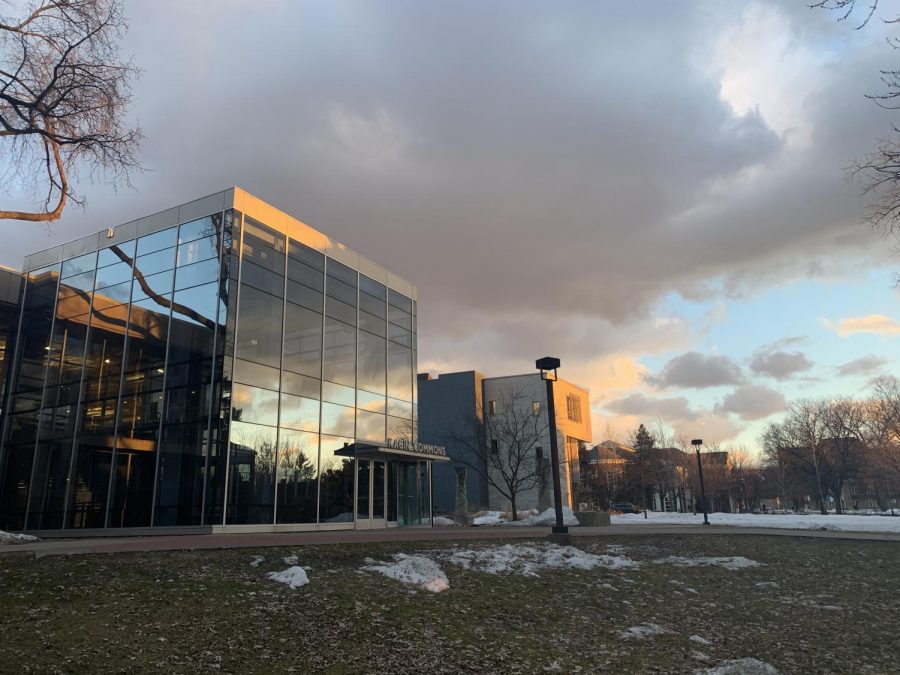President Rivera Announces New Partnership with Posse Foundation
February 4, 2021
On Tuesday, Jan. 26, President Suzanne Rivera announced a partnership between Macalester and the Posse Foundation with the goal of recruiting and supporting Black, Indigenous and other students of color, especially from the Twin Cities.
In her email announcement, Rivera framed the partnership as part of a broader effort, introduced last summer to bring in students from historically marginalized groups to the Macalester community through financial aid and programmatic support. The partnership continues Rivera’s personal push to commit Macalester to anti-racism, equity and inclusion.
The Posse Foundation’s work involves identifying and recruiting promising high school students from underrepresented backgrounds into student cohorts, or ‘posses’. Posse scholars receive full-tuition scholarships from selective colleges and universities, as well as programmatic support like pre-college training, on-campus mentoring and career development through the partnership.
“I am excited that, by entering into the Posse Foundation partnership, Macalester will be the first college ever to select a posse from within the state of Minnesota,” Rivera wrote in an email. “This strengthens the commitment we made through [the] creation of our Minnesota Opportunity Scholarship Fund over the summer.”
The founder and president of Posse, Debbie Bial, contacted Rivera shortly after her arrival at the college to suggest the partnership. Familiar with the Posse Foundation’s work at Case Western Reserve University, where Rivera worked prior to her tenure at Macalester, she anticipated the partnership would benefit Macalester and make college more accessible for BIPOC and low-income students from the Twin Cities area.
According to the Posse Institute, the research branch of the Posse Foundation, most program alumni belong to an underrepresented racial minority group and 57% of Posse Scholars are first-generation college students. Macalester’s first Posse group will include 10 students from the Twin Cities enrolling at Macalester in Sept. 2022 with full-tuition scholarships.
The partnership represents a shift from former president Brian Rosenberg’s view on Posse and similar programs. As President, Rosenberg was not a “big fan” of Posse and cohort-based initiatives due to “the way that students in those programs are treated differently than students who are not.” Conversely, President Rivera indicated that her experience with such programs had been uniformly positive and she anticipates the partnership will benefit Macalester’s student body.
Despite the strengths of Posse’s programming for BIPOC and low-income students and its advancement of Macalester’s core values of diversity and inclusion, some have concerns about a lack of on-campus support after they arrive.
Ayana Smith-Kooiman ’22, a QuestBridge Scholar and a Black student from Wisconsin, is cautiously optimistic about the partnership but worries that the focus is too much on college access and not enough on the college experience.
“I think local recruitment is a great idea [and] I think those programs are really amazing for giving BIPOC students, first-gen[eration] students [and] low-income students the opportunities afforded to other people,” Smith-Kooiman said. “It’s more the concern surrounding how you support the students once they’re here.”
In gauging what that on-campus support might look like, Smith-Kooiman felt that the perspective of students was missing from the conversation. Rivera recognized the need for student input and indicated in an email to The Mac Weekly that she would be engaging with students on how to improve on Macalester’s commitment to diversity and inclusion. Currently, Rivera is meeting regularly with a group of faculty and staff she assembled last fall including representatives from Admissions & Financial Aid, Student Affairs and Academic Affairs to discuss future opportunities as well as ways to support Macalester’s existing cohort-based programs like Bonner Scholars, QuestBridge, and Mellon Mays.
“Student input [on the partnership] should have been there from step one,” she continued. “Especially if you’re working with BIPOC communities, you should have had BIPOC students in the room because they could have helped you to bridge a gap there if you had one.”
Rivera mentioned that the group of faculty and staff are not a formal committee and that they will be seeking student input once their path forward is more solidified.
“We are organizing our thoughts first and then plan to seek feedback from students and alumni before identifying specific priorities,” Rivera wrote in an email. “We absolutely will include MCSG [Macalester College Student Government] as one (but not the only) source of student input.”
MCSG President Fatiya Kedir ’21 also views the partnership positively, suggesting that it is a step in the right direction. Nonetheless, Kedir stressed that more needs to be done to support students for whom college is not as accessible in both the admissions process and on-campus experience.
“I’m a Bonner Scholar, and I know how impactful that experience was for me,” Kedir said, “It’s helpful [to] come together and ask each other questions in regards to financial aid or in regards to just life as a BIPOC at Mac. On all of these fronts, Posse would be helpful.”
I do think that [Posse’s] success really leans on how Macalester will embrace it because I think this is just one of many steps Macalester needs in order to reflect its commitment to both diversity and inclusion,” she added.
Kedir cited access to food on campus and mental health support for BIPOC students as areas in need of improvement, especially during the ongoing Covid-19 pandemic.
Rivera hopes the partnership will serve as progress toward building a more diverse student body and increased support for low-income and students of color from the Twin Cities and Minnesota more generally.
“This partnership with Posse is consistent with the priorities I have talked about since I arrived at Mac,” Rivera wrote. “It is a step forward on the path toward increasing the number of domestic students from historically excluded groups and providing the support all students need to flourish here.”












